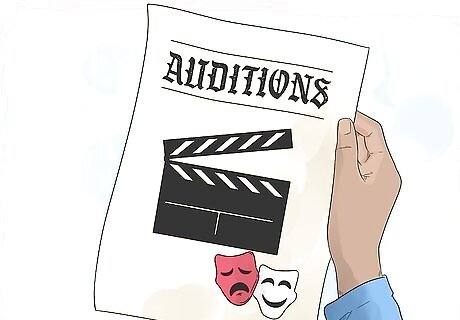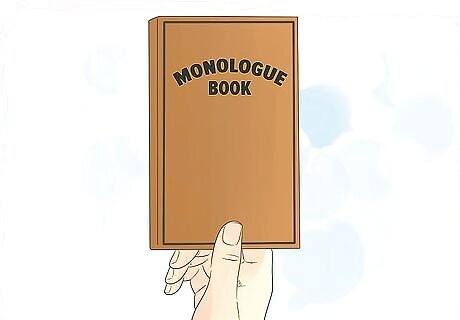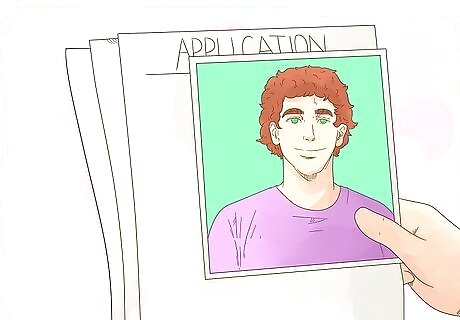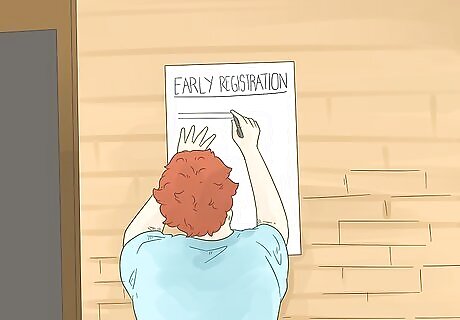
views
Finding an Audition

Learn about the different types of plays. For instance, within the larger categorizations of dramas and comedies, there are many subsets. Some classics, such as Shakespeare, Chekov, and the Greek playwrights, most often use a complex language structure, characterized by very long passages of text. Don't be intimidated by that aspect; it will eventually get easier once the director gets involved and you've had time to go over the play. Consider the unique requirements of different kinds of theater productions. Stage play auditions usually start out with monologues, and if the director thinks you may fit into their production, they may make you do scenes with the other hopefuls for the callbacks. Understand what you are preparing for. If you don't have a large stage presence or you can't project, the theater may not be for you.

Search for audition notices. Now you know what it is you are going to be involved in. This article will mainly be focusing on the stage play style of auditioning because the method can be adapted to fit a film audition. After deciding to commit to a project, find a production. Usually, it is possible to find audition notices in a local university's theater department (some college main stage shows may allow people from the community to fill roles, rather than strictly students) or find a local community center and see if any directors have posted a call for actors. On occasion, directors may advertise in the local paper (usually in the entertainment/arts section) or community magazine.

Pursue a call for actors. When you find a call for actors, look at the character types to see if you fit the descriptions. If you are a 40-year-old white male, you probably won't fit into a role for a 20 to 25-year-old Hispanic male. Remember, if you are a guy trying to audition for "The Vagina Monologues" or "Top Girls", you won't be cast. So be aware of the character types. Sometimes directors may make concessions for actors (such as if you are younger and they can't find enough older people to fill roles, or you are a good enough actor to fill the role, etc). If you are close, then don't be afraid to audition. Make sure to write down all the available information (such as contact numbers, play name and author, directions to audition, etc.) so that you aren't scrambling to find out information at the last minute. It is a professional courtesy not to take down audition notices until after the audition has happened, so leave the audition flyer where you found it. Don't take it with you (unless there are many in the area where you found them).
Preparing for Your Audition

Prepare. Read the audition's requirements. Most notices will tell you what you need for the auditions (physically and performance-wise), such as headshots, resumes, dance clothes, and what you'll need to do for the audition. Usually, for contemporary productions, the requirements are two contrasting monologues (comedic and dramatic). For Shakespearean plays, classical soliloquies from other Shakespearean plays, Marlowe, or Thomas Kyd will do. Aside from that, the notice will tell you what else you need: a song, a devised piece, etc. Be sure to follow these things to the letter. To go into a Shakespeare audition with a Tennessee Williams monologue or some Arthur Miller is usually suicide for the audition, especially if you tell them that you read the notice.

Find a monologue. This may be one of the most difficult steps in this process. For the monologues you need, you will need to scour over many different plays and anthologies to find the right one. Most of the time, the best course of action is to find a monologue that is similar to the play you are auditioning for (i.e. for a Tennessee Williams play, use an Arthur Miller-written monologue). This will enable the director to see instead of envision how well you can play in the style. For example, a Shakespearean actor fits into a more contemporary style. For help in finding monologues, ask a local theater buff, a theater professor, or talk to the director of the production. These people will be able to help you the most, and will probably have the resources from which you can draw ideas. If all else fails, go to the library and just begin reading plays that take place in the same time period as the production for which you are auditioning. On the flip side, if you already have your monologues, then you've already won half the battle.

Practice for the audition. Now that you've found the monologues you need, memorize them. There is no set way to do this; it is just something each person does on his or her own. Just make sure they are fully memorized. Most directors won't cast people who flub badly during their monologues or read off of a script during their first audition (unless they see something in you that they really liked or need). Once memorized, keep practicing until the day of the audition.
Auditioning

Dress for success. No sneakers, no jeans, no ripped t-shirts, and no scraggly five o'clock shadows (or the female equivalent). It won't look good if you get up on stage and look disheveled. If you have to dance with your audition, bring a spare set of clothes so as not to ruin your nice ones before you do your acting audition.

Bring all your copies of headshots and resumes. Bring more than one headshot and resume copies so that if there is a panel of people auditioning you, each of them can have one. It will help them remember you better.

Get there early. Most productions will have you fill out forms detailing your past experience, vital statistics, and availability. They may also have time slots for you to sign up to do your audition. The earlier you arrive, the more slots you can pick from. Arriving early also gives you time to warm up. Do vocal exercises, stretches, and tongue twisters. Don't botch your monologue just because you didn't stretch out your tongue.

Be friendly to all those around you. Don't be confrontational. If you do get cast and they also get cast, you'll be around them for the whole duration of the production and they're going to remember if you were unkind during the audition. Be a team player. Other actors don't take kindly to anyone who has a large ego and projects an attitude that says, "I'm the star." There is simply no room to think you're better than anyone else. This is especially true in a university or community theater. After all, this is supposed to be a fun learning experience, and since no one is being paid a lot to be there, no one owes you anything, even if you do get the lead role.

Listen and observe during the audition. Sit quietly and wait your turn. Make sure to listen; in some auditions, the stage manager or director will give you added instructions that weren't on the notice. Those may be vitally important, such as time limits on monologues, or the procedure in which they will audition.

Wait for your name to be called and then proceed to the stage. Before saying anything, make sure that you have their full attention. You don't want to begin while they are still writing or talking to one another about the previous actor. Be confident. The assessors aren't looking for someone who fidgets and doesn't want to be in front of people. Come with an aura of confidence. Be firm and stand tall. Wait until you've achieved eye contact with all of them so that they can listen to you from the very beginning.

Do your monologue. Perform with confidence and as how you practiced it. After you do your monologue, the director may ask you some questions or ask you to do a certain part from your monologue again. Be patient, answer all questions truthfully, and do the requested part to the utmost of your ability if asked. It may pay off when the director makes their final decision. Once finished, take a small bow and say thank you, and exit so the next person can audition.

Be patient post-audition. This is probably the toughest part of the audition, even more so than monologue hunting. This is the time when you feel most helpless - your fate, at least for this role - is now out of your hands. After the audition you can either stick around or leave; just make sure you know where the callback list will be posted or, if there are no callbacks, where and when the final cast list will be posted. If you need to leave, be courteous to the other actors and leave quietly. Don't stress about the audition. Most times actors post-audition will psyche themselves out by analyzing each and every part of the audition, then agonizing until they see the cast list. Don't do this. Sometimes there will be many days in between audition and final casting, and sometimes there is even a second audition for callbacks to narrow down the field. If that's the case, then be prepared to work with other actors in scenes from the play, and possibly even read for characters you don't want the roles for. However, don't stress out. It's out of your control, and if you don't get cast, it's not because you are a bad actor. A more likely reason is that the director couldn't find a place for you in his/her vision of the production. After the cast list is posted, it's perfectly fine to ask the director what you need to improve upon or what you could have done better in the audition. Directors are usually very gracious about this because they can analyze it from a third person point of view and tell you exactly what it was they were looking for. Be careful not to be rude. Don't start slinging accusations and don't be upset with them just because you weren't cast. If you were cast, congratulations. You made it and good luck out there!




















Comments
0 comment